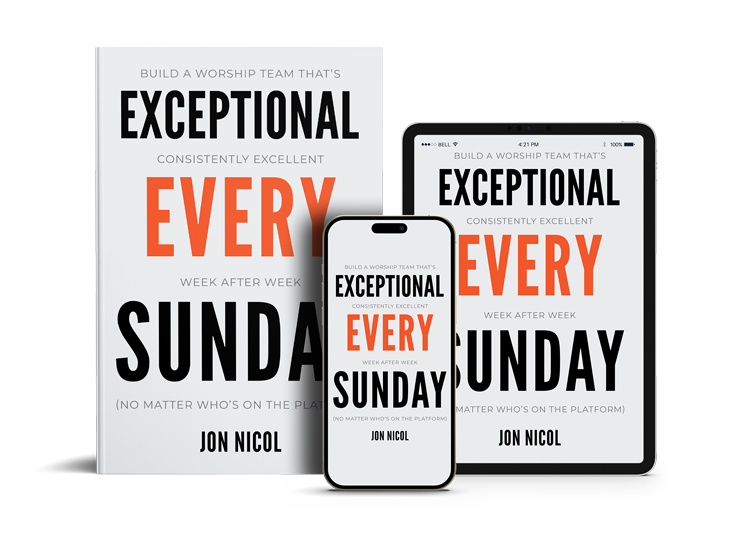Planning Powerful Worship Sets
What comes to mind when you read these three words?
Powerful… worship… set.
Maybe it’s words like awe… wonder… transcendence…
Or maybe descriptive phrases like all hands are raised… a movement of the Spirit… falling to our knees… unashamed adoration…
Or maybe adjectives like engaged… expressive… anointed…
Every church has a different definition of a powerful worship set ranging from…
People falling over (Pentecostal church)…
to people going under (Baptist church).
People excited about coming in (attractional church)…
to people excited about going out (missionary church).
People spontaneously singing (charismatic church)…
to people semi-audibly singing (Presbyterian Church).
People speaking in a different language (AofG)…
to people speaking an ancient language (Latin Mass).
People singing with a killer band on stage (Modern Non-Denominational)…
to people singing with NO band on stage (Church of Christ).
People gazing up in transcendent wonder (Vineyard Church)…
to people gazing down at their shoes (Minnesota Lutherans).
Joking and stereotypes aside, let’s move beyond the styles, modes, diverse theologies, and whatever variety of “the feels” is valued by different churches, and instead…
Let’s look at how we get there.
Creating and leading a powerful worship set requires the same four critical pieces whether…
- You’re planning an ancient liturgy or a playing new song you wrote this week.
- You’ve got an awesome band or an a cappella choir (which can also be awesome).
- You’re a full-time ‘professional’ worship pastor or a former team member who was ‘voluntold’ to lead the worship ministry.
Here are the four parts to a powerful worship service:
- Planning
- Preparation
- People
- Presence
Let’s talk about each one.
Planning
Planning a powerful worship set in your setting probably means getting the right elements in the right order. Those elements might include…
- songs
- scriptures
- segues
- spoken word
- silence
- sacraments
You may only have one or two of these elements in your worship set, or you might incorporate all of them.
I’m not here to tell you which ones to use and what order to put them in. But let me encourage you to do one thing:
Plan an intentional journey.
Whether the average church attendee can articulate this or not, they want to experience both the Otherness of God — transcendence — and God’s nearness — imminence.
Now, nothing we plan can “make” that happen. But we can map a route in and through different worship elements to help us focus on the wonder of a transcendent and holy God, as well as the nearness of his affectionate love.
Not every set can span the entire spectrum from transcendence to imminence. If you only have space in your set for two songs and a short scripture, you won’t be able to. And that’s OK.
The goal is to be intentional about the path you want to lead with those few elements. Think about what will create an environment that encourages people to worship some aspect of God’s vast fullness.
While I’d love to teach more on planning your worship sets, that’s not for this article. But let me say this before we move on.
Planning worship is a craft. It’s something you can grow in and improve at.
One way to grow is to spend time studying your and other church’s worship sets. And not just the powerful ones, but the passable ones (that were just so-so) and the pathetic services that tanked.
There’s so much you can learn just from observing. And reach out to me if you want to a deeper dive into the craft of planning exceptional Sunday sets.
Preparation
Your well-planned worship set now needs to be brought from paper (or PCO) to the platform. And that happens with preparation. There are three big components of preparation.
Personal Practice
This is when you and your team (vocals, instrumentalists & even techs) invest their personal time into being ready to lead, play, sing, mix, etc.
Rehearsal
Rehearsal brings together the different musical parts and technical roles to shape the songs and sets. When someone fails to learn their part, rehearsal changes from a “putting it all together” event to a “learning the song” effort.
That’s why we push the idea of “practice is personal; rehearsal is relational” at WorshipTeamCoach so much. When team members (and leaders) invest the time into learning the songs before rehearsal, that rehearsal allows the team to focus on more than just the mechanics of the music. They can focus on…
- the dynamics of the songs to help create the journey
- seamless segues to avoid distractions and keep the focus on worshiping
- what Biblical expressions of worship fit what’s going on in this song or moment
- visual leadership cues and other ways to engage the congregation
…all of which will help create a powerful worship service.
Heart & Mind
Our platform worship will never exceed our private worship. Leaders and team members alike need to prepare for the platform through personal times of pursuing God.
People
The third part of a powerful service is the people. The more people know their roles (and are ready for them — i.e., prepared), the more likely your worship service will be exceptional.
The platform team has multiple roles:
- They all are to worship God.
- The band accompanies the sung worship.
- The music director should make it easy for the worship leader to lead.
- The worship leader(s) and other upfront singers model what worship can look like to the congregation.
- They all invite the congregation to participate in different ways.
While the production team…
- Supports the platform team, allowing them to sound their best.
- Creates a quality mix that’s inviting and encourages participation.
- Helps create an environment that invites people to focus on worship (graphics, lighting, etc.)
And sometimes, we forget the congregation has a role to play in creating these powerful worship sets. Their job is not to be spectators but to participate and worship.
Of course, not everyone will step into the role of worshiper. But part of the goal of each worship service, Sunday-after-Sunday, is to help build a culture of eager participation in gathered worship.
(‘Building a worship culture’ goes beyond the scope of what we can talk about here. But I wrote about this extensively in my book, Exceptional Every Sunday.)
Presence
And the final ‘piece’ (which is also ‘The Whole’) is the Presence. The Holy Spirit. The One who comforts, connects, convicts, empowers, and binds us all together.
The Holy Spirit doesn’t ‘need’ our planning and preparation to create a powerful worship experience. But God has always been about inviting us to partner with him, inviting us to make on earth what is in heaven.
Because of that, the Presence isn’t something that “shows up” on Sunday if we sing certain songs and get the haze levels set just right.
The Presence of God is already there, inviting us in. Our job in the gathered worship service is to celebrate that, to marvel in God’s greatness, and to experience his love… together.
But the Presence isn’t just about the worship gathering. The Spirit is present and active in all of it — the planning, our personal preparation, the rehearsals, the technology, the people, etc.
So our efforts of planning, practice, rehearsals, and run-throughs aren’t just leading up to a time to a gathering in God’s Presence.
Those efforts and events can be living sacrifices where the Spirit of Christ is every bit as active as Sunday morning.
Your Takeaway
As we wrap, let me encourage you to do two things.
First, begin viewing your planning and preparation as an act of worship, trusting the Holy Spirit to guide and lead you.
The Holy Spirit is in the administrative and mundane as much as the powerful moment of corporate worship.
Second, encourage those in your worship ministry and congregation to see themselves as partners with God in creating a Sunday gathering.
That’s everyone — from the leader to the sound tech to the parking lot attendant to the person who rushes in five minutes late from dropping off their kids in the children’s ministry.
We’re all part of making Sunday morning a meaningful and powerful gathering of God’s people celebrating Him and his great work.
 If you want help developing more powerful worship gatherings, get Exceptional Every Sunday: Build a Worship Team That’s Consistently Excellent Week after Week (No Matter Who’s on the Platform). Right now, you can get the digital version of this book for a low-low price. And, you get bonus bundle of trainings and tools to help you implement it quicker.
If you want help developing more powerful worship gatherings, get Exceptional Every Sunday: Build a Worship Team That’s Consistently Excellent Week after Week (No Matter Who’s on the Platform). Right now, you can get the digital version of this book for a low-low price. And, you get bonus bundle of trainings and tools to help you implement it quicker.
Get Exceptional Every Sunday here.
This article was originally published in Worship Musician Magazine, December 2021 issue and has been modified from the original.
Stuck?
Learn how to level-up your team with this free video training.







